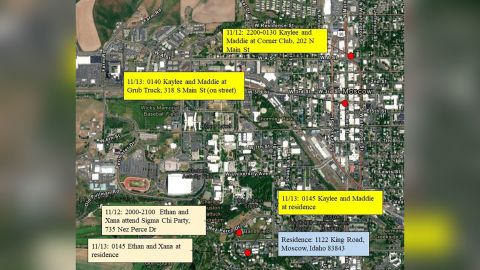CNN
—
As many University of Idaho students returned to campus this week, the police investigation into the stabbing deaths of four of their peers continued – but not without confusion over a key case detail.
Nearly three weeks since the college students were found stabbed to death in an off-campus home on November 13, dozens of local, state and federal investigators have yet to identify a suspect or find the murder weapon.
The unresolved deaths of the victims – Ethan Chapin, Kaylee Goncalves, Xana Kernodle and Madison Mogen – continue to trouble the community of Moscow and the university, where students have been given the option to complete the semester remotely if they aren’t comfortable returning to its main campus.
In the past week, police and prosecutors have made irregular statements about the nature of the killings, which the Moscow Police Department initially described on November 15 as an “isolated, targeted attack” that presented “no imminent threat to the community at large.” Police backtracked on that statement the next day, saying they could not be sure there was no risk to the public.
Then, on Wednesday, the Moscow police said in a statement that the prosecutor in Idaho’s Latah County erroneously said this week that “the suspect(s) specifically looked at this residence,” and “that one or more of the occupants were undoubtedly targeted.”
The police statement said the prosecutor’s comments were a “miscommunication,” adding that, “Detectives do not currently know if the residence or any occupants were specifically targeted.” The comment contradicts several earlier remarks by police that characterized the attack as “targeted.”
In order to clarify the confusion, Moscow police said in a release Thursday, “we remain consistent in our belief that this was a targeted attack, but investigators have not concluded if the target was the residence or if it was the occupants.”
Despite the uncertainty blanketing the campus over the lack of a suspect, students gathered Wednesday night for a vigil in honor of the slain victims.
Blaine Eckles, the university’s dean of students, encouraged the crowd to “tell the fun stories, remember them in the good times and do not let their lives be defined by how they died, but instead remember them for the joy they spread and the fun times they shared while they lived.”
As detectives continue to scour the city for information, here’s where the investigation stands.
The last few days have brought some incremental public updates in the case, including the possibility that there was a sixth roommate living at the house where the students were killed.
Detectives have said three of the victims – Goncalves, Kernodle and Mogen – lived at the house with their two surviving roommates, who police have not named. Investigators are now aware of a sixth person who is listed on the lease as a resident, but do not believe they were in the home when the killings took place, police said in a Thursday update.
Police initially said Chapin lived at the house but have since said he was only visiting.
On the night of the killings, Goncalves and Mogen were at a bar in downtown Moscow, and Chapin and Kernodle were seen at a fraternity party. Two surviving roommates had also gone out in Moscow that night, but returned to the house by 1 a.m., police said, noting they did not wake up until later that morning. Investigators do not believe they were involved in the deaths.
By 2 a.m., all four victims had returned to the home, according to police. Detectives earlier said Goncalves and Mogen returned to the home by 1:45 a.m., but they updated the timeline last week, saying digital evidence showed the pair returned at 1:56 a.m. after visiting a food truck and being driven home by a “private party.”

The next morning, the two surviving roommates in the home “summoned friends to the residence because they believed one of the second-floor victims had passed out and was not waking up,” police said in a release. Somebody called 911 from the house at 11:58 a.m. using one of the surviving roommates’ phones.
“The call reported an unconscious person,” Moscow Police Capt. Roger Lanier said last week. “During that call, the dispatcher spoke to multiple people who were on scene.”
When police arrived, they found two victims on the second floor and two victims on the third floor. There was no sign of forced entry or damage, police said.
The victims were likely asleep when the attacks began, according to the Latah County coroner. Each victim was stabbed multiple times, the coroner said, and some had defensive wounds.

Extensive evidence has been collected over the course of the investigation, including 113 piece of physical evidence, about 4,000 photos of the crime scene and several 3-D scans of the home, Moscow police said on Thursday.
Detectives have received testing and analysis of the crime scene evidence from Idaho State Police Forensic Services, and they will continue to receive the results of additional tests, according to police.
“To protect the investigation’s integrity, specific results will not be released,” police said.
Detectives also collected the contents of three dumpsters on the street where the house is located and seized five nearby vehicles to be processed for evidence, according to police.
In an effort to locate the weapon – believed to be a fixed-blade knife – detectives contacted local businesses to see if a similar knife had been purchased recently.
Investigators are also relying on a trove of public tips, photos and videos of the night the students died, including more than 260 digital media submissions that people have submitted through an FBI form, police said. Authorities have processed more than 1,000 tips and conducted at least 150 interviews in an effort to advance the case.
But even with the piles of evidence at their fingertips, authorities are asking for the public to submit any surveillance video or tips about unusual behavior in the relevant areas, even if it appears there is no movement or content in them.
In the absence of significant advances in the case, rumors have spun around the case regarding the victims, potential suspects and unusual happenings in the area. Police have attempted to tamp down on misinformation by addressing a few of the issues directly.
Investigators say they believe the following people were not involved in the killings:
- Two surviving roommates.
- Other people in the house when 911 was called.
- The person who drove Goncalves and Mogen home.
- A man seen in surveillance video from a food truck visited by Goncalves and Mogen.
- A man Goncalves and Mogen called “numerous times” in the hours before their death.
Police also dismissed online reports that the victims were tied and gagged as inaccurate.